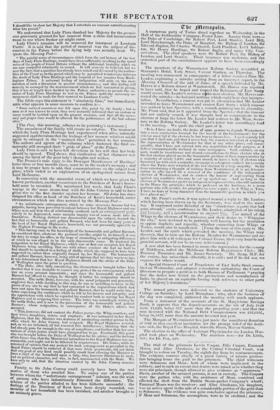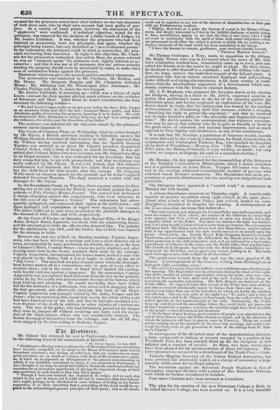The trial of the prisoners Lewin Caspar, Ellis Caspar, Emanuel
Moses, and Alice Abrahams, in the Central Criminal Court, was brought to a close on Tuesday, the eighth day from its conimencement. The evidence consists chiefly of a great variety of minute particu- lars bringing home the guilt to the prisoners. The chief witnesses were Solomons and Moss ; both of whom were implicated in the robbery, and to such an extent that doubts were raised as to whether they were not principals, though allowed to give evidence as " approvers." Davis, another of the accused persons, is not in custody. The Caspars were the parties who, with the assistance of Moss, contrived and effected the theft from the Dublin Steam-packet Company's wharf; Emanuel Moses was the receiver ; and Alice Abrahams, his daughter, was an active agent in the sale of a considerable portion of the gold-dust to Solomons. The evidence was quite conclusive against the prisoners, if Moss and Solomons, the accomplices, were to be credited; and the -counsel for the prisoners rested their chief defence on the bad character of both these men, who by their own account had been guilty of per- jury. In a variety of small points, however, the statements of the " approvers " were confirmed. A technical objection, raised for the prisoners, was reserved for the decision of a fuller bench of Judges, by Mr. Justice Littledale. It was, whether the prisoners who had been indicted as accessories, were not principals, and again, whether the principal being known, but ouly described as " an evil-disposed person" in the indictment, the prisoners could be tried as accessories, the prin- cipal not having been convicted. In reply to this objection, Mr. Clark- son for the prosecution contended, that unless Moss, the person referred to, was an "innocent agent," the prisoners were rightly indicted as ac- cessories ; and that it was not at all necessary that the person actually stealing the property should even be mentioned by name, to make out a case of substantive felony against the prisoners.
Numerous witnesses gave the accused parties excellent characters. The prosecution was conducted by Mr. Clarkson, Mr. Bodkin, and Mr. Doane. Mr. Sergeant Bompas and Mr. Chambers defended Moses ; Mr. Adolphus and Mr. Prendergast Alice Abrahams ; Mr. Charles Phillips and Mr. C. Jones the two Caspars. Mr. Justice Littledale, in summing up—which was a labour of eight hours—warned the Jury against placing much reliance on the evidence of Solomons and Moss. After about an hour's consultation, the Jury returned the following verdict-
" We find. Lewin Caspar guilty as an accessory before the fact ; Ellis Caspar as an accessory before and after the fact; Emanuel Moses guilty, and Alice Abrahams guilty of receiving the property, knowing it to be stolen. We wish - to recommend Alice Abrahams to mercy, believing she had been acting under the influence, the advice, and the directions of her Hither."
The sentence was deferred till the objection raised by the prisoners' counsel can be disposed of
The Court of Common Pleas, on Wednesday, tried an action brought by Mr. Glynn, a British merchant residing in Gibraltar, against Sir William Houston, Governor of that fortress in 1831. It appeared that Sir William having received information that the Spanish General Torrijos wa's secreted in or about Mr. Glynn's premises, despatched Colonel Maher, with a body of troops, to search for hint. It was ad- mitted that Colonel Maher forced an entrance into Mr. Glynn's dwelling in an illegal manner ; but it was contended for the Governor, that his duty compelled him to act with promptitude, and that no damage was really suffered by Mr. Glynn. It was said, indeed, that Mrs. Glynn's confinement was hastened, and that her infant died in consequence ; but the child lived for four months after the outrage. Mr. Sergeant Wilde made an eloquent speech for the plaintiff, and SirJohn Campbell defended Governor Houston. The Jury returned a verdict with 501. .damages for Mr. Glynn.
In the Secondaries Court, on Tuesday, three separate actions for libel, arising out of the late election for Bristol, were decided against the pro- prietors of Felix barley's Bristol Journal. The Journal had insinuated a charge of perjury against the complainauts, who were witnesses in the late case of the " Queen v. Virrier." The defendants had subse- quently apologized, and expressed their regret at the publication ; and these apologies and expressions of regret were repealed by counsel. The juries (different in each case) awarded to the plaintiffs damages to the-amount of 100/., 1501., and 175/., respectively.
At the Court of Excise, on Saturday last, Samuel Ellis, of the King's Arms, Roupel Street, Lambeth, was fined 300/. for adulterating liquor, and for attempting to bribe the officers who detected him. The penalty
• for the adulteration was 1001., and the further line of 200/. was imposed for the attempt to bribe.
Between one and two o'clock on Monday morning, Captain Anger- stein, who had been driving a carriage and four a short distance out of town, accompanied by sonic gentlemen, his friends, drew up at the door of Limner's Hotel, Conduit Street ; where the party alighted, and, after staying some time in the house, resumed their seats on the carriage. Captain Angerstein, having turned the horses round, desired a man who was placed on the dickey with a keyed bugle, to strike up the air of "Jim Crow." The man had not played many notes when the thorough- bred horses started off at a tremendous rate, in spite of every effort to restrain them ; and at the corner of Bond Street dashed the carriage with fearful violence against a lamp-post. By the concussion, Captain Angerstein was precipitated head-foremost from the box to the ground ; where he lay for nearly two minutes under the legs of the horses, which kept kicking and plunging. lie would inevitably have been killed, but for the assistance of a policeman, who succeeded in dragging hint to the foot pavement, and afterwards carrying him back to the Hotel. Captain Angerstein was promply visited by Sir Astley Cooper and Dr. Jones ; who on examining him found that nearly the whole of his teeth bad been knocked out by the fall, and that he had also sustained a se-
vere fracture of the skull, in addition to other injuries of it serious na-
ture. The rest of the party, who had fortunately perceived the danger they were in, jumped off without receiving any hurt, with the excep-
tion of the bugle-player, whose arm was considerably bruised. The horses disengaged themselves from the carriage, and ran off till they were stopped by the iron railing in Berkeley Square.



























 Previous page
Previous page